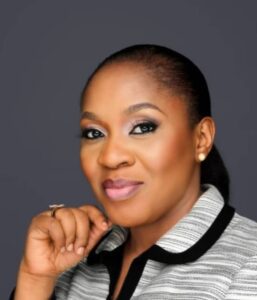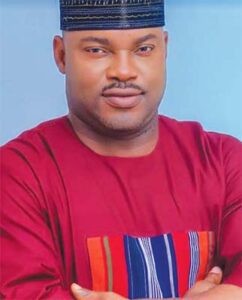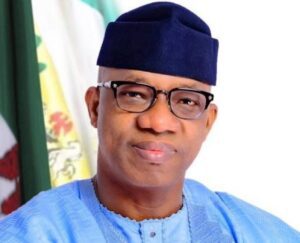
Traditional institution is losing respect — Oba Akinola, Olubosin of Ifetedo
Oba Akinola Oyetade Akinrera, Latiiri 1, is the Olubosin and the Paramount ruler of Ifetedo Kingdom, the headquarters of Ife South Local Government Area. The reverred monarch is a solicitor and advocate of the Supreme Court of Nigeria who had worked with Nigeria Police Force and Nigeria National Petroleum Corporation before ascending the throne of his forefathers. In this interview with Jeleel Olawale, the Chairman, Ife South Local Government Council of Obas spoke on myriad of challenges bedevering traditional institutions and culture in Nigeria with respect to outgone year 2022. The excerpt:
How can you describe traditional institutions in the post independence era?
Traditional institutions in the post independence era seem to be losing respect. A lot of things has been politicised, coupled with the fact that the way we traditional rulers are conducting ourselves is unbecoming and we are made to understand that in the past before a person could become a King, he would go through some stages.
I went through these stages before I became Olubosin of Ifetedo Kingdom. But in some cases you will just see people will go and buy crown and start introducing themselves as Obas. All these culminating into how politicians are touching around with traditional rulers. This is making the institution to really loose respect and it is not good at all.
What is the solution to this?
I think there is need for the body of traditional rulers and government to sit and discuss, but the system is copied from the United Kingdom but their queen commands respect of the government. But in this part of the world, reverse is the case.
I think it is necessary for both sides to come together, look at the situation and discuss, because it will be in the best interest of government if the glory of traditional institutions is restored because traditional rulers are the closest organ or administrators to the people and by virtue of this, we play a pivotal role in the lives of our subjects by providing security of life and property, settling disputes among them to ensure that there is peace and orderliness in the society. I think it is important that there is need to sanitize the institution and restore glory of the institution so that traditional rulers will continue to command the respect of their subjects and it will make things to be easier for the government.
How can you describe traditional institution in the year 2022, how did the institution fare?
I give glory to God that the year (2022) has come to an end because things have not been easy. As a traditional ruler, what we are going through is unpalatable. Gone are those days when subjects would come to the King and give them gifts and able men to support Oba to work in the farm.
But now our subjects will storm the palace, asking for support (money and food). Though, we are the closest one to them, so it is not their fault. It is the situation we find ourselves as a people in the country.
2022 was really challenging because of hike in price of commodities. Average Nigerian found it difficult to live and that increased pressure on traditional rulers, not me alone. What am saying is happening to all Obas because we do meet, compare notes, so, year 2022 was really challenging.
The 2023 is a year of election and I want to appeal to people to vote wisely, and whoever that wins should put welfare of the citizenry in his front bunner because the hardship in the land is enormous and this has put pressure on traditional rulers. Year 2022 was a mixture of challenges and blessings, because not everybody that started the year ended it. So, we have to thank God for life.
Are you not bothered on how traditional rulers are being dethroned in the country?
This is a matter of concern and I think the issue came up when a number of us discussed the issue at a particular forum and the consensus reached was that we should give the Governor(s) who have done that benefit of the doubt.
What they wanted to do is to review the appointment of the concerned traditional rulers to see if it conformed to due process. But If it conformed to due process, they don’t have choice than to give them approval, but what really created the problem was the timing of their appointment and we are optimistic that the appointment will be upheld.
Our culture is gradually going into extinction, what are the traditional rulers doing to restore our culture?
Traditional rulers are the custodians of culture and tradition. We cannot say that Yoruba tradition is losing popularity, but the area of my fear is language. If you go to market, the “Alabaru” who puts baby in her back does not want to speak Yoruba language to her child but does not even understand English language. This is happening among Yorubas. If we look at the three major tribes in Nigeria, the two other tribes (Hausa and Igbo) are doing very well in respect to their language. It is we Yoruba that we want to prove that we understand English and do better than the native speaker. We are not teaching our children how to speak Yoruba language. This has become subject of discussion among us in a number of occasions. The decision reached is that it is part of our duties as traditional rulers to educate our subjects about language. The area where I think we are not really doing well is dressing and there has been improvement. The Yorubas are now getting married in our native attire and this is a good trend. So, it is glad that our children are now coming back to promote our dressing culture. So, we need to do a lot to ensure that Yoruba language is not going into extinction.
What do you think is the solution to challenges facing Yoruba language?
I want government to make the study of Yoruba language a compulsory subject in secondary schools. All Yoruba students should be made to offer Yoruba language, the same as Hausa and Igbo, so that our languages in this part of the world will not go into extinction. If it is made compulsory, parents will be paying attention to it from the nursery to secondary school level because if they do not prepare for it, that may cause failure of their children to gain admission into secondary school, they will prepare for it.
If the language is made compulsory, the elites will know that it is a subject that their children must pass, so they will learn it early. Therefore, the child will take a deeper interest in it and it is not a good thing if our children cannot speak our language. It is really unfortunate because a lot is built in the language. I quite agree that elites are not helping matter but if they know that their children must offer it and pass, they won’t have a choice than to offer the language.
There is the view that traditional rulers chalking up about 5% of local government revenues with no discernible level of effort in society and individuals can play their mobilisation role, what is your take?
The issue of 5 per cent allocation of the local government, I will say neither here nor there, it is contentious. I am one monarch who doesn’t want to get myself involved in an unnecessary controversy. So, as a result of this, I will not want to delve into that. As to whether other individuals can play our roles, whether we take 5 per cent or not as traditional rulers, we have our duties to play in the lives of our subjects because there have been traditional institutions before the introduction of 5 per cent you are talking about and they have been doing very well. It is our duty to mobilize our subjects and sensitize them about government activities such as their civic responsibility and 2023 national census. No any individual, no matter how influential the person is can do it the way traditional rulers can perform the role, because we have our way of communicating to our subjects. So, we have machinery of reaching out to our subjects. The traditional institution’s roles are inalienable and cannot be overemphasized.
The state of neglect of traditional institutions is unpalatable which probably culminated in insecurity, what do you think is the way out?
The issue lies with the government and it is the government that can do it, to come to the aid of traditional rulers. There are cases of traditional rulers being kidnapped, at some instances killed, and what has been responsible for that is neglect of the institution by the government in which they are not well taken care of. Traditional rulers should be secured because they are vulnerable and we settle disputes in our domains and not everybody will be happy with our decisions/judgements. So, if you have done justice in a given matter, and the party that lost out is aggrieved, he/she may want to hit back at the King.
The King needs to be secured. The welfare of monarch is important and we were told in those days that the traditional aids were being paid by government. But today, the reverse is the case. Therefore, there is need for government to take welfare of traditional rulers a priority. Politicians do visit palaces during electioneering campaigns to receive royal blessings. The monarchs present their demands to them but the government is trying its best but there are constraints and there is no government that can do everything for its people.
The dwindling revenue is affecting the government even the oil theft is not helping matter too. To be fair, some of them are trying their best in keeping faith with their electoral promises. It is the duty of traditional rulers to remind them of what they have not done.
What does future really hold for traditional institutions in Nigeria?
The future is bright and it is a good one. But nowadays, there are some impostors among traditional rulers parading themselves as monarch. You see people wearing crown about and they are just ordinary chiefs.
They will go and get staff of office themselves. They tend to put traditional institution into disrepute but people will not know the difference, once they see the dressing, ordinary person will think they are truly monarch.
Government should revisit the Chief Law and make it more stringent, and there should be ways of dealing with impostors among us.
Another thing is about our welfare and the demand for constitutional roles for traditional rulers. These roles will make us command more respect from our subjects and it will make us perform our traditional duties to maintain law and order at the grassroot level.
Ordinarily, We now have successful professionals such as: lawyers, pharmacists, doctors, professors, engineers as traditional rulers.
What are the efforts being made by the council of traditional rulers to flush out fake traditional rulers among them?*
The Institution is taking steps to flush out these undeserable elements. I think last year, the Osun State Council of Obas under the leadership of Ooni of Ife, Oba Adeyeye Enitan Ogunwusi, Ojaja II, set up a committee to look at Osun State Chief’s Law with the hope of reviewing it.
I am a member of the committee, led by Aragbiji of Iragbaji, Oba AbdulRasheed Olabomi, and the issue is to deal with the menace of fake chiefs addressing themselves as traditional rulers. The report was submitted and the state government went ahead to uphold our recommendations and one of the recommendations is for the State Government to set up a tripartite committee that will include monarchs, executive and legislature. So, the committee will look into the Chiefs Law, and I received a letter as member. I am optimistic that the committee will deal decisively with impostors among us. It is going to regulate a lot of things, because, Oba Adeyeye Enitan Ogunwusi is really bordered about it and doesn’t want traditional institutions to be bastardized.
What are your contributions since your ascension into the throne of your forefathers in Ifetedo land?
I thank God that since my ascension into the throne, my subjects, home and diaspora have been really cooperating with me with a view to take the town into a greater heights. I hold them gratitude.
What does the future hold for the ancient town, like projection?
The future I am projecting for the town is that in the next 20 years, I want Ifetedo to have attained greatness, especially in education, producing about 50 medical doctors. Education has been of more paramount importance to me.
I convened education summit in April, 2019. What led me to that was that students who were supposed to be in school during school hours were seen roaming the streets. Then, I asked my aids to collect and search their bags and we saw school uniforms in their bags or some putting on mofty on their school uniform.
I had meeting with principals of secondary schools, they explained their predicament to me that some of the students would come to school for sometime and later leave but would not go home. There are cases of some students who would gather themselves somewhere and be smoking marijuana.
One of the resolutions of the summit was that parents and guardians should sit-up especially on education of their children. Many of the parents have left responsibilities of taking care of their children into the hands of their teachers.
So, any student roaming the streets during school hours will be picked up and handed over to me. Then, his/her parent has to explain. Today, hardly can you see children of school age roaming streets in Ifetedo, because their parents have yielded my warning. We had another summit in August, 2022 which was well attended. And, Ifetedo Development Council recently informed me that a committee has been set-up to work on the recommendations of the summit.The next investment is agriculture, because Ifetedo is an agrarian environment and we want to invite some experts to train our youths on agriculture. We will make land available for them and I will take the lead by having my own farm to set the pace.
Your advice for your subjects and Nigerians come 2023 general elections?
My advice is that they should restrain themselves from all acts of violence and hooliganism during the elections. I have been telling them that if any politician is engaging them to forment violence, they should be courageous enough to tell such politician to call his children to do it.
The politicians should play the game according to the rules and play politics without bitterness, because in any contest, there is bound to be a winner and loser. Let whoever that wins be magnanimous in victory.
The loser should show that he believes in democracy by embracing the winner, because the person who loses today may win tomorrow. They should be committed to their electoral promises.



